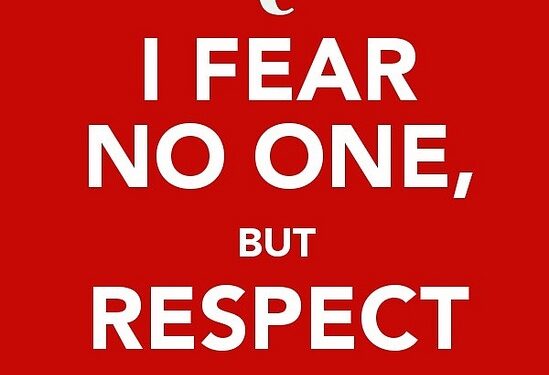Introduction
In the realm of personal development and social interactions, the phrase “I fear no one, but respect everyone.” – Tymoff stands as a powerful mantra. It encapsulates a balanced approach to life, where confidence and humility coexist. This article delves into the essence of this philosophy, exploring its significance, benefits, and practical applications in daily life. By embracing this mindset, individuals can navigate their personal and professional spheres with grace and strength.
Understanding the Philosophy
Fearlessness
Fear is a natural human emotion, often arising from perceived threats or uncertainties. However, living in constant fear can hinder personal growth and limit opportunities. The idea of fearing no one is not about reckless bravado but about cultivating inner strength and resilience. It encourages individuals to face challenges head-on, unencumbered by the fear of judgment or failure.
Respect for All
Respect is the cornerstone of healthy relationships and societal harmony. It involves recognizing the inherent worth of every individual, regardless of their status, background, or beliefs. Respecting everyone means approaching interactions with empathy, kindness, and an open mind. It fosters mutual understanding and cooperation, paving the way for positive and productive engagements.
The Significance of “I Fear No One, But Respect Everyone.” – Tymoff
Building Confidence
Adopting this philosophy helps in building self-confidence. When individuals let go of fear, they become more assertive and self-assured. This newfound confidence enables them to pursue their goals and aspirations with determination and conviction.
Enhancing Relationships
Respect is a fundamental aspect of meaningful relationships. By respecting everyone, individuals create an environment of trust and mutual appreciation. This approach strengthens personal and professional bonds, leading to more fulfilling interactions and collaborations.
Promoting Equality
The philosophy of fearing no one and respecting everyone promotes equality. It challenges hierarchies and prejudices, advocating for a world where everyone is valued equally. This mindset can contribute to a more inclusive and just society.
Practical Applications of the Philosophy
Personal Growth
Embracing this philosophy is a powerful tool for personal growth. It encourages individuals to step out of their comfort zones and take risks. Whether it’s pursuing a new career path, developing a skill, or overcoming a personal challenge, the fearlessness component pushes individuals to strive for excellence without the fear of failure.
Professional Development
In the professional realm, this mindset can be transformative. Leaders who fear no one but respect everyone will likely inspire and motivate their teams more effectively. Such leaders create a positive work culture where employees feel valued and empowered to contribute their best.
Conflict Resolution
Respect is crucial in resolving conflicts. When individuals approach disagreements respectfully, they are more likely to find common ground and reach amicable solutions. This approach reduces hostility and promotes a collaborative problem-solving environment.
Social Interactions
In social settings, fearing no one but respecting everyone can lead to more meaningful and enriching interactions. It encourages individuals to engage with diverse perspectives and cultures, broadening their horizons and fostering a sense of global citizenship.
Benefits of Embracing the Philosophy
Improved Mental Health
Letting go of fear can significantly improve mental health. Fear often leads to stress and anxiety, affecting overall well-being. By adopting a fearless mindset, individuals can experience greater peace of mind and emotional stability.
Stronger Social Networks
Respecting everyone helps in building a strong social network. People are naturally drawn to those who treat them with kindness and respect. This approach can lead to a supportive and diverse network of friends, colleagues, and acquaintances.
Greater Resilience
A fearless and respectful attitude fosters resilience. It equips individuals with the strength to face adversities and bounce back from setbacks. This resilience is crucial in navigating the ups and downs of life with grace and perseverance.
Implementing the Philosophy in Daily Life
Self-Reflection
Self-reflection is a crucial step in embracing this philosophy. Individuals should regularly assess their fears and biases, understanding how these affect their behavior and interactions. This awareness is the first step towards change.
Practicing Empathy
Empathy is at the heart of respect. Practicing empathy involves actively listening to others, understanding their perspectives, and responding with compassion. This practice can enhance interpersonal relationships and foster a culture of respect.
Setting Boundaries
While respecting everyone is important, it’s also crucial to set healthy boundaries. Respecting oneself involves recognizing one’s limits and ensuring that interactions are mutually respectful. This balance is key to maintaining healthy relationships.
Continuous Learning
Adopting a fearless and respectful mindset is an ongoing process. Individuals should continually seek opportunities to learn and grow. Whether it’s through reading, attending workshops, or engaging in meaningful conversations, continuous learning helps in reinforcing this philosophy.
Conclusion
“I fear no one, but respect everyone.” – Tymoff is a powerful guiding principle for personal and professional life. It encapsulates the essence of confidence and humility, promoting a balanced approach to interactions and self-growth. By embracing this philosophy, individuals can unlock their true potential, build meaningful relationships, and contribute to a more respectful and inclusive world. This mindset not only enhances personal well-being but also paves the way for a more harmonious and equitable society.


